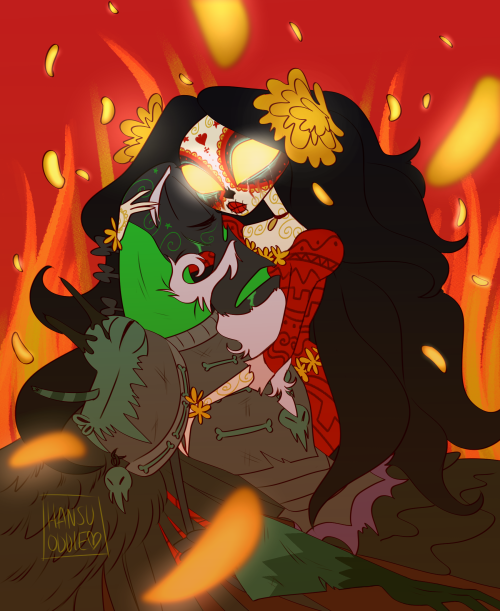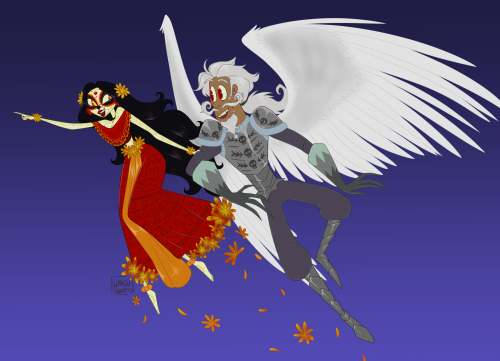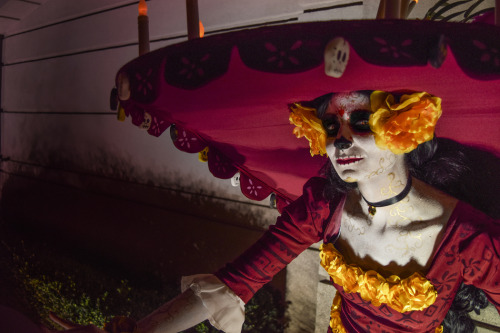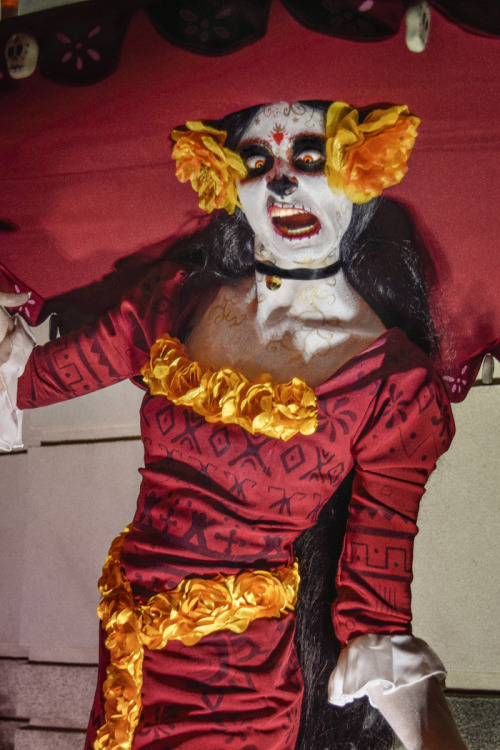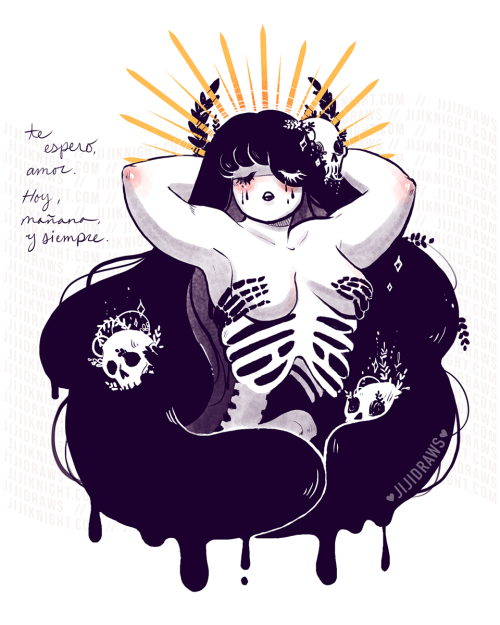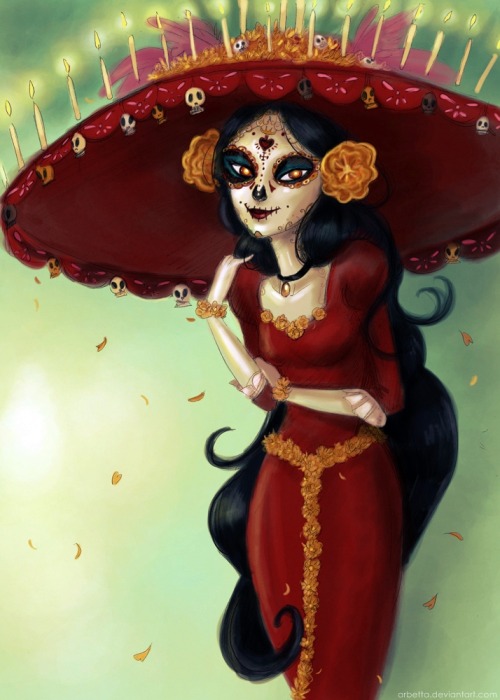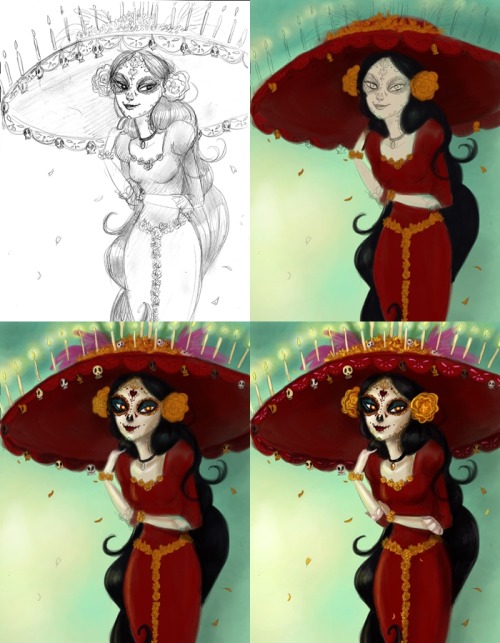#la muerte
Tánatos es la personificación de la muerte no violenta, siendo la muerte violenta ejercida por las Keres (horribles espíritus femeninos que sobrevolaban los campos de batalla buscando heridos y moribundos). Siendo un ser simbólico, Tánatos tenía (en la mitología de Homero y Hesíodo) por madre a Nix (La Noche) y por hermano a Hipnos (El Sueño), de quien se dice que, intentando imitar a su hermano mayor, sume en la inconsciencia del sueño a los mortales que le tocan, ya que supuestamente cada noche él y Tánatos discuten sobre con cuál de los dos se irá cada hombre…
El aspecto de Tánatos suele variar, habiéndoselo representado de las siguientes maneras:
1) un niño alado,
2) Eros con las piernas cruzadas y la antorcha invertida,
3) un niño dormido en los brazos de Nyx,
4) un joven llevando una mariposa (que representa el alma) o una corona de amapolas (asociadas al dios y a su hermano por sus propiedades hipnagógicas),
5) un joven alado con una espada envainada en el cinturón,
6) un hombre o un joven vestido de negro y con una espada.
La Muerte representada como un ser antromórfico ha existido en muchas culturas desde los inicios de la humanidad. A partir del siglo XV, por ejemplo, en nuestra cultura, comenzó a ser representada como una figura esquelética que lleva una enorme guadaña y viste con un manto negro con capucha. También se le da el nombre del Ángel de la Muerte. Aunque no se hace mención en la Biblia de tal Ángel, existe una mención de Abbaddon (El Destructor) cuya identidad corresponde al Ángel del Abismo. La Muerte, no puede ser detenida de ninguna manera y a menudo es una mera funcionaria: no posee control sobre el destino ultra terreno de las almas a las que le toca conducir; solo se presentar a buscar a aquellas personas a quienes les ha llegado la hora. En muchas ocasiones, la Muerte es muda, no habla ni se deja ver ni conocer y su visita es inevitable, pero en algunos cuentos de la tradición oral, la Muerte habla, bromea, hace tratos, amadrina a algún humano e incluso en el imaginario de las historias filmadas, puede incluso jugar al ajedrez.
El Ángel de la Muerte. Evelyn De Morgan, 1880

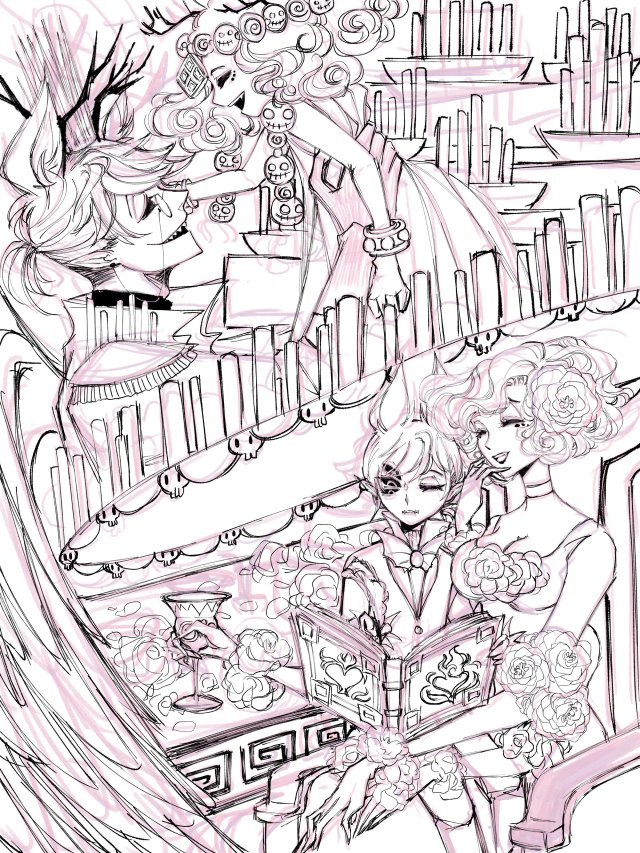




BOOK OF LIFE AU
Angel Dust as La Muerte
AlastorasXibalba
Lorenzoas Candle Maker, Angelo as Jack Skellington because why not?
CharlieasManolo
VaggieasMaria
CherriasJoaquim(Angel hasn’t bet on her because he knew there would be another person would better suited for her than Vaggie)
Huskasgrandpa (great-prandpa actually, Charlie got 2 grandmas, Rosie and Mimzy)

Tonight, I will make you mine
I will make you mine
I will make you mine
If you let me, if you let me
–
Yeah I still do art, just haven’t been motivated to post any in a while

Eyes only for you…
Xibalba: “I wasn’t that drunk last night!”
Last night:










La Muerte y Xibalba - The Book of Life (2014)

Day 13: La Muerte from The Book of Life Movie
Is anyone talking about how lovely the Spanish versions of these songs are? I haven’t seen it yet but I can’t get over them… so after getting home from seeing the movie again tonight I felt like translating the Spanish version of The Apology Song. It actually sticks really close to the English for the most part but there are so many little nuances I still love about it and I thought others might be interested too. If anyone is interested I might do ‘Te Amo Y Más’ (I love you too much) as well (Update: here) but for now here’s ‘Si Puedes Perdonar’:
If you want to avoid a Spanish explanation/lesson for the translation and just look at the fixed version (from a Mexican) here you go:
“Toro, I am ashamed and I begyou to forgive
Everyone that ever came to kill you (one/any day).
You suffered the injustice of manyothers just like you,
I offer you my apologies, respect and gratitude.
Can you Forgive me?Toro,can you forgive me?
My truth is in this song
If we wanted to kill each other,
I’m begging you to listen to me today,
If you can forgive, if you can forgive
Peace will come (to you)
If you can forgive, love will live;
Love will always live.
If you can forgive, love will live,
Love will always live on(implied).”
Correct Spanish version:
“Toro, me da pena y te suplico perdonar
A todos los que un día te vinieron a matar.
Sufriste la injusticia de otros tantos como tú,
Te ofresco mis disculpas, respeto y gratitud.
¿Me perdonas? Toro, ¿me perdonas?
Mi verdad está en esta canción.
Si nos quisimos matar,
Te ruego que hoy me puedas escuchar.
Si puedes perdonar, si puedes perdonar
La paz llegará.
Si puedes perdonar, el amor vivirá,
Siempre vivirá.
Si puedes perdonar, el amor vivirá,
Siempre vivirá.”
It’s safe to say that the curiosity to hear the other version (in this case, the English version) was too much to resist too, and once I went home from the movie did the same and likewise noticed the little things that make both versions their own.
That said, without trying to be biased (I am Mexican after all) I prefer the Spanish version in the songs that weren’t in English during the film (for example, “Creep” by Radiohead was played in English in the Cinema, but had some subtitles —not at all accurate for some reason — for the people that didn’t spoke the language, our guess was that it was so because it’s a Cover, and that’s alright), and after reading your translation its safe to say you’ve got the major part of the gist, so I’ll take your word and help you a little with the translation (and add the right lyrics in Spanish since most of it was because the grammar was lost on them):
Toro me da pena y te suplico perdonar
A todos los que un día te vinieron a matar
Sufriste la injusticia de otros tantos como tú
Te ofresco mis disculpas, respeto y gratitud
Me perdonas, Toro me perdonas
mi verdad está en esta canción
Sí nos quisimos matar
te ruego que hoy me puedas escuchar
Si puedes perdona si puedes perdonar
La paz llegará
Si puedes perdona el amor vivirá
Siempre viviráToro I’m ashamed* and Iimplore you** for forgiveness
For everything that brought about your death one day
You suffered the injustice of others just like you
I offer you my apologies, respect and gratitude
Forgive me, Toro forgive me
My truth is in this song
Yes we wanted to kill***
Today I’m begging you** to listen to me
If you can forgive, if you can forgive
Peace will come****
If you can forgive, love will live
love will always live
**Implore you.- In this case it’s a tricky one: since the word “implorar” exists, it is mostly used to add a dramatic flare to the action of asking for something (that isn’t necessarily forgiveness, but can be) that is most likely not going to happen; it’s like trying to ask for a miracle because you want it to happen but are aware that it won’t, so it has a grandiose effect that your plead is more talk than actual belief that it will come through. “Suplicar”, on the other hand, is a more down-to-earth manner of actually ‘begging’ for something that you want to actually happen, and though it may be impossible, you’ll do whatever it takes for it to become a reality. In a manner of speaking, it’s more honest because of the humility of the action (being willing to dispatch of pride by openly begging), where the glamor of your words (making them pretty) isn’t necessary to decorate the meaning behind it, since the action in its purest form speaks by itself (wow, that was a little hard to put into words, hopefully the difference is more clear instead of the other way around). That said, perhaps the better word for “suplicar” would be “beg”.
Now with the whole sentece; your translation hits spot on, however, the sentences are connected—not parting from one another, which is why the forgiveness that Manolo asks is for the next sentence, like so:
- Toro, I am ashamed and I begyou to forgive***
***When Manolo talks to the Bull, he’s actually speaking with him like a living being, not a higher entity, also openly stating “te suplico perdonar” is the prelude for a forgiveness to something he’s yet to confess, hence why both sentences change when you connect them, giving us that change in the sentence. Also, he emphasized the “me” when he’s speaking.
- Everyone that ever came to kill you (one/any day).****
***“A todos” is openly referring to every single person in a specific group, room, etc.; an ensemble as a whole of somebodies (animals included). It can be confused with “todo(s)”, which refers to basically the same with the major difference that it includes non-living things in said ensemble (i.e. everything in the room; everything you see), or actions (i.e. everything you do).
In the song, since it connects immediately with the “a”, it’s connecting the direct 'object’, who are the ones he’s asking the Bull to Forgive. So the difference in the translation is that Manolo is asking the Bull for his family’s forgiveness, not his own (which makes sense, because he hadn’t wronged any Bull, and since his family wasn’t capable of asking forgiveness themselves; personally it made the song that much deeper).
- You suffered the injustice of many***** others just like you.
*****“Sufriste la injusticia de otros tantos como tú” Perfectly translated, just missing one word. “Tanto” is used to signify quantity—a high amount of it; so it changes the sentence a lot when you place the word or remove it. Manolo actually accentuates that word in his song and gives it a small pause.
- ******Can you Forgive me?Toro,can you forgive me?
******This would be on the lyrics, since they failed to place the appropriate grammar: “¿Me perdonas? Toro, ¿me perdonas?” Again, this changes the sentence and is understandable to be lost to someone who doesn’t have spanish as their mother tongue given it would fall on the pronunciation alone. When Manolo says: “Me” in the literal sense it would be “to me” (“a mí”), which is something regarding oneself, the following “perdonas” is the conjugated verb of forgive, literal translation would be “You (person) forgive (act without time; so basically can be such person that has yet to forgive or that it already has forgiven)” (“Tú perdónas”); in this scenario the “Me” included as a question gives it the time, so it’s asking for the Bull to forgive Manolo (for the damage he and his family did him), not just stating (in spanish the translation stated would be actually demanding forgiveness instead of asking it; we’re often told we used to much politeness in our words, and it was lost because of the grammar). Then he repeats the question adding the “Bull” to make it more personal (talking one-on-one), but maintains it as a question that can be either a “yes” or a “no” as opposite of just assuming the action will be given (all the while, Manolo doesn’t know if his apology will be enough, that’s why it’s important to add the “can you” to the translation that is lost in the way the lyrics are written but are expressed while sung).
- If we wanted to kill each other,******
*******“Si nos quisimos matar” Yeah, again, it falls on the lyrics, but it was a though one (actually, your translation was pretty spot on; Spanish is hard, and punctuation changes everything). The “si” doesn’t have an accent, because it’s not an answer, only stating a fact, a probability, chance, or a possibility (in this case the first and latter, given the hesitance on his part to make both of them the case). “If” would be the appropriate word.
And the “nos” (“between us/among us”) is a short term for “nosotros” (meaning “we”); the thing here that makes it tricky, is that “we” is presented twice with the “quisimos” (“we wanted” depicting an action that wasn’t completed but yearned). So it’s missing the whole meaning regarding a tentative subject: if we wanted (between each other)
“If we wanted (both of us) to kill each other”
- I’m begging you to listen to me today******.
Not much of a change, but the order of the words change the sentence since it emphasizes the need for the Bull to listen him 'Today’—at that precise moment.
- Peace will come (to you),
In this I admit confusion. When we say “la paz llegará” it literally means that 'peace will come’ (the to you or others/everyone/the situation is heavily implied), however, when we speak of “la paz” in regards to the death, we don’t mean it was a peace offering, but as “Eternal Rest (”descanso") for/to the/your soul/someone". So, not sure if it needs to change (guessing not).
Toro, I am ashamed and I begyou to forgive
Everyone that ever came to kill you (one/any day).
You suffered the injustice of manyothers just like you,
I offer you my apologies, respect and gratitude.
Can you Forgive me?Toro,can you forgive me?
My truth is in this song
If we wanted to kill each other,
I’m begging you to listen to me today,
If you can forgive, if you can forgive
Peace will come (to you)
If you can forgive, love will live;
Love will always live.
If you can forgive, love will live,
Love will always live on(implied).
All in all, the song is very touching and heart-feeling, and it’s wonderful to know you loved it so much that you took the time to do such a thing. Words cannot express the warmth this touching film made in us, because while it has fictional ways to depict one of our most sacred traditions (for instance Xibalba is actually a place) its a very firm portrayal to explain the majority of our traditions and culture and share it with others. We (mexicans) always enjoy sharing and making others take part of them (the more the better as is often said), so take joy and take part of it.
Hopefully this also helped you a little in your advanced classes.
“La Catrina”/”La Muerte”, finished, just in time for the Halloween/Día de los Muertos/Día de Todos los Santos :)
Post link
Some drawing steps of “La Catrina”/”La Muerte” from “The Book of Life”, I have to add the final details ^^
Post link
Halloween at school!
There was a costume contest…. I didn’t make it in time but the moment I walked into the room the first prize winner just handed me his prize without a word so that was flattering….
I didn’t have time to do la muerte’s specific makeup but it was a great test run for the costume.
Gorgeous!
Post link









3 years ago, I built my first costume. The reason I made it was because the voice actor of Inuyasha was coming to a convention near me and I thought everyone had to wear a costume for comic con. I didn’t really think I was going to continue making more but 3 years later, I’m up to my 9th cosplay and I’m almost at 15k! I am grateful to have met so many talented and incredible people over these past few years. I’m glad to have been able to join in panels as well as compete in costume contests. Most of all, I’m happy to have helped others in creating something of their own whether it’s building a costume or other forms of art. I can’t thank you all enough for your love, your kindhearted messages, and all the Sesshomaru pics/ fanfics With 2019 coming to an end, I thought I’d share all the builds I have made from the earliest to the latest.
Which costume is your favorite?


